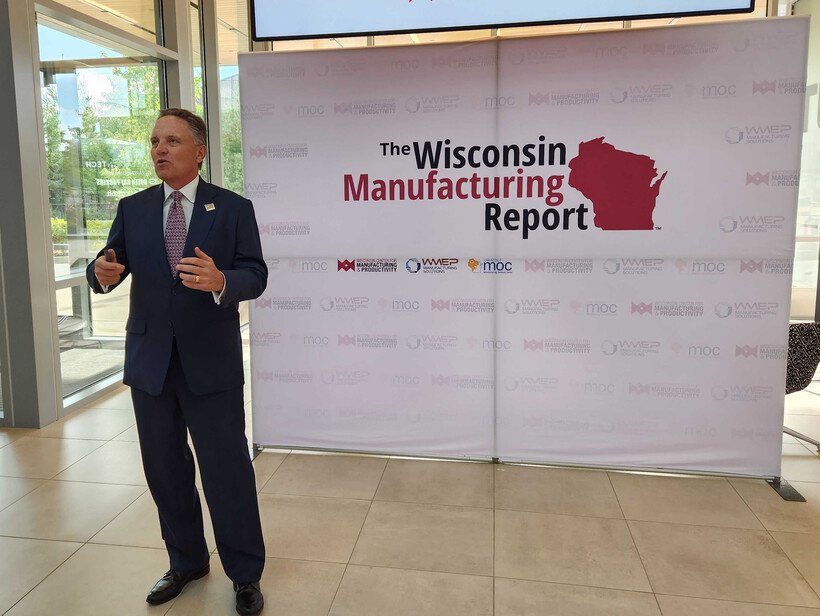More Wisconsin Manufacturers Are Optimistic About State’s Economy
But annual survey finds hiring and retention remain key concerns.

Buckley Brinkman, CEO of the Wisconsin Center for Manufacturing & Productivity, speaks to northeast Wisconsin manufacturing stakeholders about the 2023 Wisconsin Manufacturing Report at Titletown Tech in Green Bay on Wednesday, Oct. 4, 2023. Joe Schulz/WPR
Wisconsin manufacturers are less pessimistic about the economy than last year and remain optimistic about their companies, but workforce challenges continue to be a top concern even as inflation and supply chain worries lessen.
That’s according to a new report from the Wisconsin Center for Manufacturing & Productivity, a public-private partnership that connects companies with resources. It surveyed 415 manufacturing executives from across the state and also took input from focus groups in Madison, Milwaukee, Green Bay and Menomonie.
Manufacturing stakeholders on Wednesday discussed the results at Titletown Tech in Green Bay. The survey found that 51 percent of manufacturers believe the business climate is headed in the right direction, but it’s not quite back to levels seen in 2021. That year, 55 percent said it was going in the right direction.
The survey shows that manufacturers are split regarding opinions on the health of Wisconsin’s economy. Twenty-three percent believe the state economy is growing; 36 percent say it’s mostly flat; 26 percent think it’s slowing down; and 12 percent believe it’s in a recession.
According to the U.S. Bureau of Economic Analysis, America’s gross domestic product grew in the first two quarters of 2023 with annualized growth around 2 percent each quarter. After some forecasters predicted recessions in 2022 and 2023, forecasters at UCLA are predicting 2024 will be a weak year for economic growth, before rebounding in 2025.
“We heard from the focus groups (that) there’s a sense that we’re not really sure where the economy is right now and what it’s going to do,” said Rob Autry, president of market research firm Meeting Street Insights, who helped compile data for the manufacturing report. “I think that leads to why we see a higher percentage of manufacturers who kind of feel that (it’s) stagnating.”
At the same time, manufacturers were very optimistic when asked about their individual business, with 85 percent saying they were confident in their company’s financial future.
“Manufacturers are the most confident group I’ve ever polled,” Autry said. “This is a consistent finding over the last three years that we’ve done the survey.”
While manufacturers are confident about their firm overall, they presented a less rosy picture when asked specifics by surveyors. According to the report, their revenue predictions fell by 6 percent from the previous year and expected capital expenses fell by 4 percent.
“We’re seeing a significant number of manufacturers that are under stress,” said Buckley Brinkman, CEO of the Wisconsin Center for Manufacturing & Productivity. “We’re interested because this has been a relatively good period of time for manufacturers. And if these guys are under stress now, they could be in for some real difficulty if things turn south.”
Like in previous years, challenges hiring and retaining qualified workers was one of the top concerns among manufacturers surveyed. Eighty-one percent of respondents said it was difficult to find qualified workers, down from 84 percent last year.
“Workforce is still the big gorilla in the room, trying to find enough workers (and) trying to find the skill set you need,” Brinkman said. “We’re beginning to see it really hamper growth in manufacturing across the state.”
He said those challenges have also shifted some manufacturers’ strategies. While companies used to be quick to shed employees during downturns and ramp up hiring during growth periods, Brinkman said they’re now more likely to keep staff employed during slowdowns.
“Now, manufacturers are realizing how much it costs to go out and find a new employee, bring them in, train them, bring them up the curve — if you can find them at all,” he said. “We’re seeing manufacturers hold on to those employees, and really invest in them.”
While workforce challenges continue to be a top concern, the share of manufacturers surveyed who said they are most concerned about overall inflation dropped from 49 percent last year to 42 percent this year. Supply chain concerns have also decreased each year since 2021, when 64 percent said it was a top concern. That number fell to 53 percent last year, and 43 percent this year.
“Last year, the big concerns on the minds of manufacturers were inflation, rising energy costs (and) supply chain concerns,” Autry said. “Those are still there, they’ve just diminished noticeably over the last 12 months. Where we have seen a little bit of an uptick are in health care costs, and finding new customers and markets.”
Listen to the WPR report here.
Wisconsin manufacturers less pessimistic about the economy this year, but still face stresses was originally published by Wisconsin Public Radio.





















